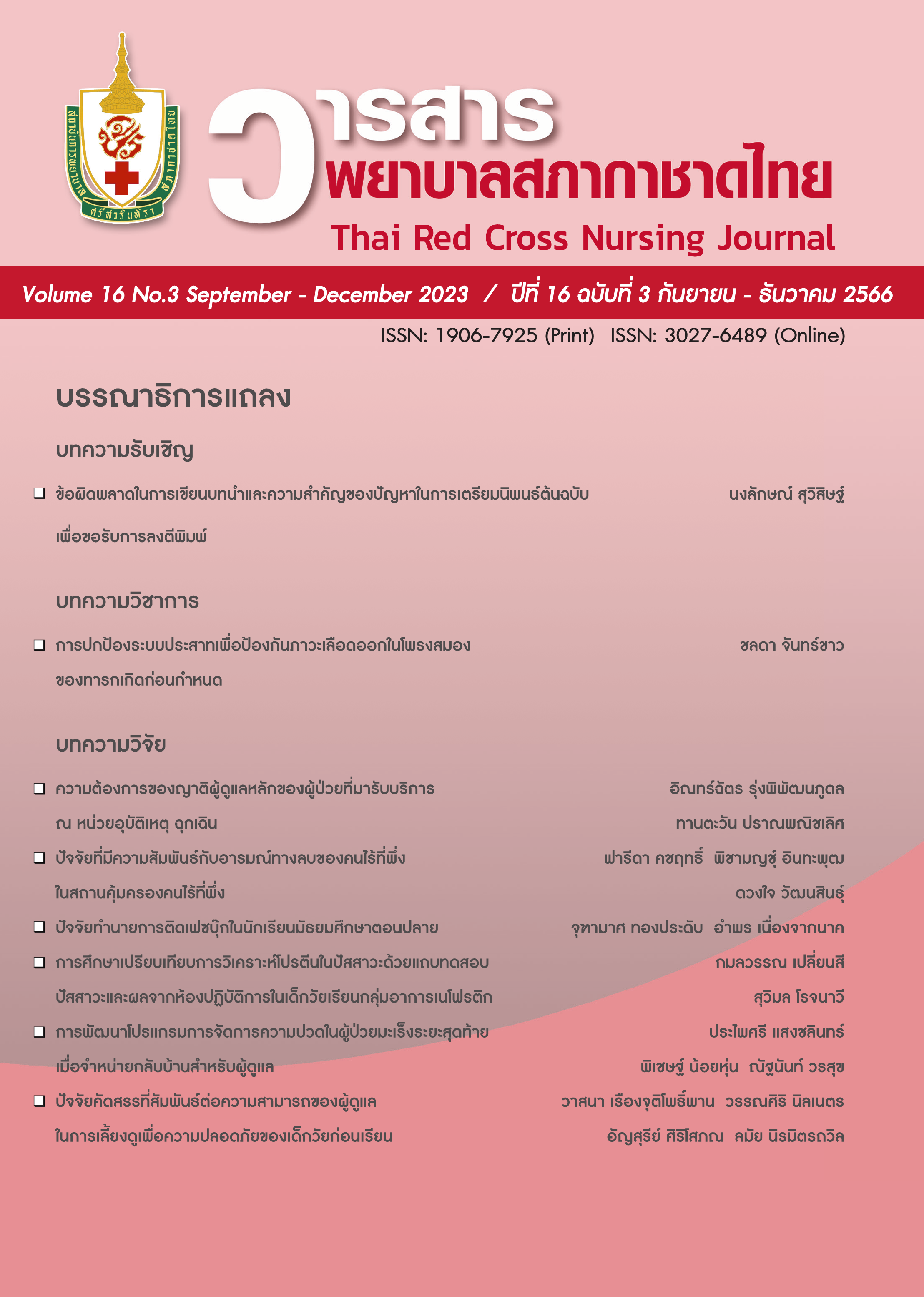Needs of Family Caregivers of Patients during Emergency Unit Visits
Keywords:
needs, primary caregivers, Emergency DepartmentAbstract
Providing health services from health care providers in the emergency department, If they know the needs of caregivers who wait for patients while receiving services, Information received and understood can lead to the development of service quality to meet the needs of both patients and relatives. This descriptive research aimed to investigate the needs of family caregivers of patients during critical illness in the Emergency Department of a university hospital and tertiary care service in Bangkok. The sample was 437 primary caregivers and were purposively selected based on the inclusion criteria. Data were collected using a questionnaire consisting of 2 parts: personal information and a needs assessment form for the primary caregiver. The instrument was validated by three experts, with a content validity index (CVI) of 1. Cronbach's alpha coefficient reliability was .92 and data were analyzed using descriptive statistics.
The results revealed that most primary caregivers of the patients visiting the emergency department were female (72.3%), The relationship between the caregivers and the patients was their children. (51.9%), aged between 21-40 years (44.9%). It was found that the average scores for the total needs of primary caregivers were at a moderate level (Mean = 3.43, SD = 0.64). Analysis of needs in each aspect found that needs for confidence and anxiety reduction have the highest mean score and are at a high level (Mean = 3.83, SD = 0.41). The following, the need for information was at a high level (Mean = 3.57, SD = 0.55), and for being close to patients, comfort aspect, support had the average score at the moderate level (Mean = 3.43, SD = 0.64; Mean = 3.25, SD = 0.78; Mean = 3.08, SD = 0.83).
The study results indicate that the 2P safety policy which focuses on patients and health care providers may require expansion to cover family needs. Specifically, a family-centered approach involving closer interaction with primary caregivers is highly recommended. Increasing the duration of visits based on specific criteria and improving communication are key strategies to fulfill greater confidence in health services, prevent emotional impacts, and enhance cooperation with medical treatment and care for patients.
References
Medical Records and Statistics Department, King Chulalongkorn Memorial Hospital. Chulalongkorn Hospital Statistics 2021. Bangkok: King Chulalongkorn Memorial Hospital. (in Thai)
FongKerd S, Himananto S, Tantalanukul S. Family-centered care: from theory to practice for ends of life care of critical patients in intensive care unit based on Thai context. Journal of Phrapokklao Nursing College 2016;27(1):170-7. (in Thai)
Klaisuban C, editor. Guideline for ER service delivery. 2nd ed. Nonthaburi: Department of Medical services; 2018. (in Thai)
Srisupha-olarn I, Ua-kit N. The Effect of meeting family-needs program on anxiety of family members of critically ill patients. Songklanagarind Journal of Nursing 2016;36(3):77-93. (in Thai)
Gilboy N, Tanabe P, Travers DA, Rosenau AM, Eitel DR. Emergency severity index, version4: implementation handbook. Rockville, MD: Agency for Healthcare Research and Quality; 2005.
Buriwong R, editor. MOPH ED. Triage. 2nded. Nonthaburi: Department of Medical services; 2018. (in Thai)
Yildirim T, Özlü ZK. Needs of critically ill patients' relatives in emergency departments. Nurs Midwifery Stud 2018;7(1):33-8. doi: 10.4103/nms.nms_100_17.
Ali S, Maki C, Rahimi A, Ma K, Yaskina M, Wong H, et al. Family caregivers' emotional and communication needs in Canadian pediatric emergency departments. PLoS One 2023;18(11):e0294597. doi: 10.1371/journal.pone.0294597.
Aguilera DC. Crisis intervention: theory and methodology. 7th ed. St Louis, MO: Mosby; 1994.
Singdong P, Jitpanya C. Caring for relatives of critically ill patients: relatives’ perspectives. Princess of Naradhiwas University Journal 2011;3(3):17-32.
Hill R. Family under stress: adjustment to the crises of war separation and reunion. New York: Harper Row; 1949.
Yamane T. Statistics: an introductory analysis. New York: Harper & Row; 1973.
Best JW. Research in education. New Jersey: Prentice-Hall; 1981.
Udchumpisai M, Sangsongrit N. Needs and preparedness of caregivers to care for medical critically-ill patients: a mixed-method study. TRC Nurs J 2020;13(1):261-81. (in Thai)
Monkong S, Sirapongam Y, Wongvatunya S. Roles of family caregivers of palliative care patients: preliminary qualitative study. Thai Journal of Thailand Nursing Council 2016;31(4):104-21. (in Thai)
Sasat S, Lertrat P, Choowattanapakorn T. Research report on model of institutional long-term care practice of olders persons in Thailand. Nonthaburi: Health Systems Research Institute; 2010. (in Thai)
Phupaiboon R, Jongudomkarn D, Niamsap Th, Dechakupt Ch, Khamhom R, Watcharasin J, et al. Changes in Thai family structure according to the life cycle: a preliminary study. Journal of Demography 2018;34(1):56-71. (in Thai)
Jampawal T. State anxiety. Buddhist Psychology Journal 2018;3(1):13-20. (in Thai)
Pansiri B, Nanthaitaweekul P. The effect of family supportive need-based program on anxiety and satisfaction among family members of head injury patients, Accident and Emergency Department. Kuakarun Journal of Nursing 2021;28(2):36-47. (in Thai)
Vichittragoonthavon S, Imsa-njuan K, Sucamvang K. Needs and received need responses among elderly patients and families in surgical intensive care unit, Maharaj Nakorn Chiang Mai Hospital. Nursing Journal 2013;40(Suppl):35-45. (in Thai)
Thongrat N, Pradubpoth K, Khanom S. The satisfaction of patients and relatives from services of in-patient department, Phrom Khiri Hospital Nakhon Si Thammarat Province. Journal of Health Sciences and Pedagogy 2023;3(1):69-83. (in Thai)
Monthira N, Thanyaluk T, Wassana D, Kannika C, Wasinee A, editors. Guidelines for good service under knowledge management process. Bangkok: Rajamangala University of Technology Krungthep; 2012. (in Thai)
Panchuay W, Soontorn T, Songwathana P. Effect of AIDET communication of registered nurses on family responses at emergency department. Princess of Naradhiwas University Journal 2022;14(3):105-20. (in Thai)
Sukkasi S, Rujiranakul P. The development of participation for development basic moral for students in honor border patrol police schools [Research]. Chanthaburi: Rambhai Barni Rajabhat University; 2018. (in Thai)
Downloads
Published
Issue
Section
License
Copyright (c) 2024 Srisavarindhira Thai Red Cross Institute of Nursing

This work is licensed under a Creative Commons Attribution-NonCommercial-NoDerivatives 4.0 International License.
เนื้อหาบทความหรือข้อคิดเห็นต่างๆ ในวารสารพยาบาลสภากาชาดไทยนี้ เป็นความคิดเห็นของผู้เขียนบทความ ไม่ใช่ความเห็นของกองบรรณาธิการ หรือสถาบันการพยาบาลศรีสวรินทิรา สภากาชาดไทย






